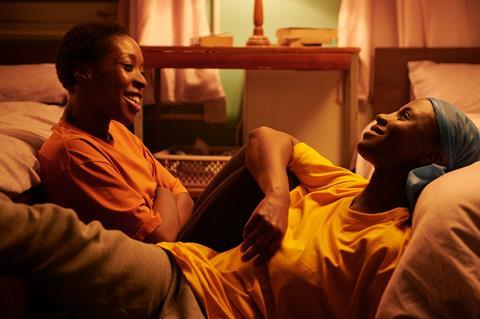Nigeria-born Joy Gharoro-Akpojotor draws on her own experiences

Dir/scr: Joy Gharoro-Akpojotor. UK. 2025. 78mins
When Nigerian refugee Isio (Ronkę Adékoluęjo) is placed in a prison-like UK asylum removal centre, it feels as though her future is over. But then a cautious friendship with her assigned roommate, Farrah (Ann Akinjirin), blossoms into something deeper. And for the first time, both women dare to hope for better days ahead. But the vagaries of the British asylum system have a way of upending plans and crushing dreams. The debut film from producer-turned-director and 2020 Screen Star Of Tomorrow Joy Gharoro-Akpojotor is small in scale and, one suspects, in budget. But while this is a familiar story and backdrop, its tender, empathetic storytelling is elevated by handsome cinematography and heartfelt performances.
Colour and lighting are used expressively
Nigerian-born Gharoro-Akpojotor makes her feature directing debut having worked prolifically as a producer, under the banner of her company Joi Productions, with a focus on Black, queer and female-led stories including Rapman’s Blue Story and Aml Ameen’s Boxing Day. She has also directed several short films including 2021’s award winning For Love. The emotional impact of Dreamers is heightened by the knowledge that the story was based on Gharoro-Akpojotor’s own experiences as a migrant; at 24, she sought asylum and had to prove to the assessor that she was gay. While it might not be distinctive enough to assert itself on the wider arthouse stage, the film should be a title of interest for LGBTQ+ festivals, events and specialist distributors.
Throughout the film, colour and lighting are used expressively. When Isio arrives at Hatchworth Removal Centre, she is dressed entirely in black. Hunched and immobile on the bed in the room that she will share with Farrah – a room which is notable for its warm, jewellery-box colour palette – she looks like grief personified. And when, during the terrifying, disorientating first night in this establishment, the cries of a woman who is being deported ring through the corridors, the frame is flooded with red light. But Farrah’s kindness and patience with her traumatised new roommate works its magic; the room they share becomes a haven from the hardness and fear outside the walls. That is reflected in the colours, which become sensual, saturated and welcoming.
Isio, we learn, has fled Nigeria because she is a lesbian, and homosexuality is illegal in her home country. Her religious mother discovered this, and, with the assistance of several men from her church, imprisoned her daughter and inflicted a misguided form of extreme conversion therapy on her. Colour, once again, is strikingly employed, with the nightmarish fragmented flashbacks bursting into Isio’s mind drenched in a strident crimson.
Isio, with the help of Farrah, and new friends Nana (Diana Yekinni) and Atefeh (Aiysha Hart), learns to negotiate the unspoken rules of the institution. The guards claim to be “there to help”, but the opposite is true. The yard bullies rule the roost with threats and violence, but their activities can be used as a distraction when Isio and her friends might need the guards to be looking in the opposite direction. Gharoro-Akpojotor stresses the bonds of friendship through quiet confidences shared between the women; less successful is a cliched cooking and dancing montage that feels like little more than padding in this already slight film.
Even with the support system and the sisterhood that Isio has built within these oppressive walls pinned with hectoring, infantilising notices, the knockbacks are brutal. When Isio’s asylum application is refused, she is sent into a spiral of despair. Farrah is on hand to talk her down and to point out that when all seems lost, the best way to resist is to dream of a better future. Sometimes, the bravest course of action is to throw caution to the wind and fall in love.
Production company: Quiddity
International sales: The Yellow Affair by Newen Connect, contact@yellowaffair.com
Producer: Emily Morgan
Cinematography: Anna Patarakina
Production design: Gini Godwin
Editing: Arttu Salmi, Victoria Boydell
Music: Ré Olunuga
Main cast: Ronkę Adékoluęjo, Harriet Webb, Ann Akinjirin, Diana Yekinni, Aiysha Hart, Lucy Ware, Dolapo Oni, Kemi Adekoya
























